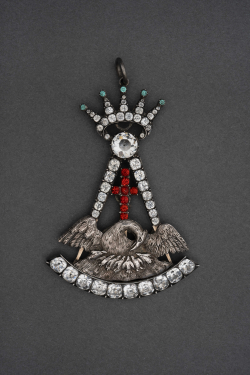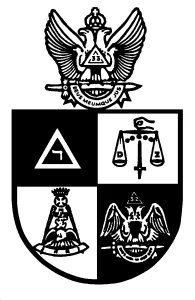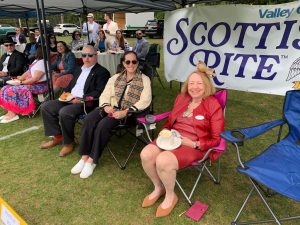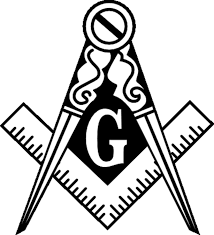In December of 1867, Edward Holland Caldwell (1844-1872) of Mobile, Alabama, received the fourteenth degree at the newly established Mobile Lodge of Perfection No. 1. The following year he received the eighteenth degree, and later, the thirty-second degree. Caldwell’s jewels for the eighteenth and thirty-second degrees survive and were recently added to the collection of the Scottish Rite Masonic Museum & Library. A special thanks goes to the staff at the library, as always, for their hard work on the article, as well as Michelle Lambert of the Grand Lodge of Alabama, Katy Osborne, Special Collections at Spring Hill College, and Larissa Watkins of the Southern Jurisdiction’s library for preserving and adding these jewels to the collection.
Crafted of silver and cut-glass stones (also called pastes), Caldwell’s jewels were formed in the shape of symbols associated with the eighteenth and thirty-second degrees. The eighteenth-degree jewel is in the shape of a compass topped with a crown (at left). An arc connects the legs of the compasses. Within the compasses is a cross highlighted by red stones and a cast representation of a pelican feeding seven chicks from the blood of her breast. On the reverse side is a cast cross and rose and an eagle with spread wings (at right). Caldwell’s thirty-second degree jewel is in the shape of a crown on top of a cross with arms of equal length with leaves or vines between the arms (at left, below). At the center of the cross is the number 32 reverse painted on glass in gold and black. On the back side of the jewel, at the center of the cross, two crossed swords are reverse painted on glass in black and gold with a white background.
Caldwell likely became a Mason in Mobile Lodge No. 40, the largest Masonic lodge in Alabama in the 1860s. He later joined a new lodge, Athelstan Lodge No. 369, constituted in Mobile in 1870. In 1868, when he took the eighteenth degree, he was the father of two young sons and involved in a local business. Caldwell and Emil Oscar Zadek (1848-1908) owned “Zadek & Caldwell, Importers and Manufacturers of Fine Jewelry” from about 1866. The firm advertised “handsome jewelry of every description. Also watches, silver ware, plated ware, opera glasses, etc.,” for customers in search of “an elegant article at reasonable prices….” Zadek was, according to the local paper, an accomplished craftsman who was not “surpassed in Mobile as a gold or silver smith.” Caldwell’s Scottish Rite jewels are not marked with the name of the manufacturer, so it is not known if his firm produced them in Mobile, or if Caldwell ordered them from another source.
Caldwell had grown up in New Orleans, the son of a wildly successful actor, theater owner, and entrepreneur, James Henry Caldwell (1793-1863). As a young student, he attended Spring Hill College in Mobile in 1856 and 1857, but does not seem to have graduated from that institution. Only a few years after he joined with Zadek in the jewelry business, Edward Caldwell’s business and circumstances changed when his older brother, James Henry Caldwell, Jr.,
died in his early 30s in 1870. Upon his brother’s passing, Edward Caldwell inherited a large estate and became the president of the Mobile Gas, Light and Coke Company. This firm was one of the companies that his father had founded. His brother had previously served as president of the business. Reflecting this change, on the first of November in 1870 Edward Caldwell and Emil Zadek officially dissolved their partnership in the jewelry business.
Caldwell’s time as the head of the Mobile Gas, Light and Coke Company was short lived. He died in 1872 while in New York City. An obituary in a New Orleans newspaper stated that Caldwell was “noted among his friends for the geniality of his disposition and his boundless liberality.” The writer also described Caldwell’s philanthropy, observing that “no call for charity” made to him was unnoticed. All appeals to him, the writer continued, received “a cheerful response” from Caldwell, “a princely income enabling him to do much good in this respect.” As a sign of respect, Freemasons in New Orleans escorted Edward Caldwell’s body to the train depot in New Orleans before it was put on a train to Mobile where Caldwell was buried. Caldwell’s two handsome Scottish Rite jewels offer evidence of his involvement in Freemasonry and speak to his pride in his association with the group.
To see more from the Scottish Rite Museum and Library, click the link below!






